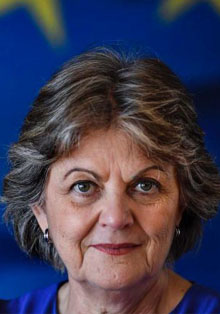Eduardo González
The Minister of Foreign Affairs, Arancha González Laya, yesterday referred once again to “the centrality of the United Nations” to explain the Government’s political position on Western Sahara, an issue for which Spain “cannot and should not advocate a specific solution”.
“Spain has been defending and defends the central role of the UN with regard to Western Sahara”, the minister affirmed before the plenary session of the Senate in response to an interpellation from Senator Luis Jesús Uribe-Etxebarria, of the Basque Group. “MINURSO is the mission entrusted with the supervision of the 1991 ceasefire and the subsequent military agreements that develop it” and “this function of supervision and assessment does not correspond either to the parties or to third parties”, she continued.
“In the political sphere”, González Laya affirmed, “it is up to the UN Secretary General (Antonio Guterres), by mandate of the Security Council, to promote a solution to the question of Western Sahara, in accordance with the parameters established in the resolutions which, at least once a year, are approved by the Security Council and by which MINURSO’s mandate is renewed”, she continued.
“Spain has always argued that the solution to the question of Western Sahara must be political, and that recourse to armed means not only contravenes the principles and values of the United Nations Charter, but can bring suffering and provoke serious instability that will benefit neither the inhabitants of the region nor, of course, its neighbours, of course, its neighbours”, said the minister, who recalled that the Spanish government has conveyed to the Secretary General “the need to appoint a personal envoy as soon as possible”, something that “is urgent” because “this political process has been interrupted for 21 months”.
With these parameters, González Laya warned, “it is tremendously important” that the Saharawi issue “be a state policy in our country, that we all row together and try to promote the centrality of the UN and that we all support the efforts of the Secretary General in the search for a solution that has to come from the parties”.
“For this reason, Spain cannot and should not advocate a specific solution“, because, “as the Security Council resolutions establish, this solution must be mutually acceptable and must come from a dialogue between the parties”, warned González Laya. “Spain’s position is firm, it is constant and it is a state position, and that position is none other than support for a solution that must be political, fair, lasting and mutually accepted”, the minister concluded.
Western Sahara is a former Spanish territory in which, legally, Spain continues to be the administering power. Last November, Unidas Podemos, a minority partner in the government, issued a statement in which it called for the holding of a referendum on self-determination in Western Sahara and demanded “the firm involvement” of Spanish institutions in favour of “the decolonisation of Western Sahara and respect for the human rights of the Sahrawi population”. In response to this statement, González Laya herself repeatedly warned that the Ministry of Foreign Affairs and the president of the government “are responsible for the foreign relations of our country”.







